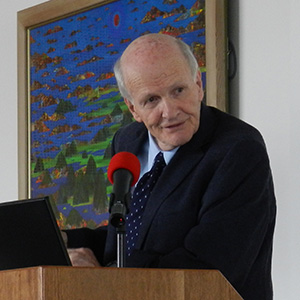

On 15 July 2014, the Vienna Center for Disarmament and Non-Proliferation (VCDNP) and Search for Common Ground hosted a panel discussion titled "A Win-Win Solution for the Negotiations over Iran's Nuclear Program," featuring Ambassador (ret.) William G. Miller, senior advisor for the US-Iran Program at Search for Common Ground, Dr. Frank von Hippel, senior research physicist and professor emeritus of public and international affairs at Princeton University's Program on Science and Global Security, and Mr. Daryl G. Kimball, executive director of the Arms Control Association (ACA).
On the occasion of the latest meeting between Iran and the Permanent Five members of the Security Council plus Germany (the P5+1), a group of renowned experts on the technical and political aspects of the Iran negotiations met at the VCDNP to discuss and identify possible compromises between the negotiation parties.
Ambassador William G. Miller started by highlighting that, even though "Iran has the capability of making nuclear weapons, (...) it has no strategic reason to do so." More precisely, in his view, Iran doesn't want to produce any weapon of mass destruction, including nuclear weapons. However, as Ambassador Miller pointed out, "Iran has insisted on its right to full uses of peaceful nuclear energy." He underlined that the salient question is how to ensure that purported peaceful activities remain truly peaceful.
Regarding the negotiations process, Ambassador Miller hopes that the parties will come to a conclusion this month, given the potential for it to strengthen peace and create possibilities for stability in the Middle East. Therefore, Ambassador Miller is also convinced that the P5+1 and Iran should work as partners in the present and in future. Ambassador Miller further highlighted the transparency of the negotiations and the high quality of the negotiations team.

Daryl Kimball continued with a presentation on some of the key issues involved in reaching a deal between the P5+1 and Iran, which are further detailed in the June 2014 ACA Briefing Book on "Solving the Iranian Nuclear Puzzle." First, he noted the significance of "resolving the possible military dimensions of Iran's nuclear program." In his view, rather than focusing on whether Iran engaged in military activities in the past, the goal is to ensure that "Iran's nuclear program is entirely peaceful in the future." Toward this end, Mr. Kimball stated that Iran needs to "provide enough information on its program, ideally on key scientists and key sites" identified in the November 2011 report of the International Atomic Energy Agency (IAEA).
Other issues Mr. Kimball discussed include agreed limits on the size and scope of Iran's uranium enrichment program that are commensurate with its "practical needs" for a civil nuclear program, as well as steps to reduce the plutonium proliferation potential of Iran's Arak heavy water reactor project, which were discussed later in more detail by Dr. von Hippel. Mr. Kimball laid out a number of possible options for solving the uranium enrichment issue, including limits on enrichment levels (below 5 percent), limits on stockpile size (< 1,000 kilograms), transitioning to more efficient centrifuges, and multinational enrichment options.
Mr. Kimball also discussed the issue of more extensive IAEA inspections in Iran. He noted that there is general agreement between the parties on this issue, including that a comprehensive agreement should include requirements for more timely notification of Iranian nuclear activities to the IAEA under Iran's comprehensive safeguards agreement and more extensive IAEA inspection authority under the terms of an Additional Protocol to the Treaty on the Non-Proliferation of Nuclear Weapons.

Dr. Frank von Hippel presented "Possible Elements of a Compromise on Iran's Nuclear Program," discussing options for solving disagreements over plutonium issues at the Arak facility and for Iran's centrifuge enrichment complex. Dr. von Hippel's comments built on two ACA articles he recently co-authored: "A Win-Win Solution for Iran's Arak Reactor" and "Agreeing on Limits for Iran's Centrifuge Program: A Two-Stage Strategy".
Regarding plutonium production, Dr. von Hippel argued that modest changes in the operation of the Arak reactor could significantly reduce its plutonium production without reducing its performance as a research reactor. By using 5 percent low-enriched uranium fuel rather than natural uranium, the Arak reactor would reduce its annual plutonium production by a factor of ten.
On possible solutions for uranium enrichment issues, Dr. von Hippel discussed a two-stage approach, whereby Iran would maintain a capacity for enriching a small amount of uranium annually for research reactor fuel in the short term (stage one) and develop a potential enrichment capacity in the longer term that would be appropriate to fuel power reactors (stage two).
For the first stage, Dr. von Hippel suggested that Iran could replace its current IR- 1 centrifuges with more effective IR-2ms, which would satisfy the needs of its current and planned research reactors with less total centrifuges. Dr. von Hippel pointed out that the stage one period could provide Iran and the international community an opportunity to more coolly assess the costs and benefits of different possible enrichment paths forward.
For stage two and in the long term, negotiators might agree on a solution currently beyond reach and also lay a base for a new global regime for enrichment, including the possibility of establishing multinational enrichment facilities and arrangements, which Dr. von Hippel suggested should seriously be explored. In this way, Dr. von Hippel posited, a solution for Iran could serve as a template for more robust monitoring of centrifuge production and uranium enrichment programs worldwide.

By continuing to use the site, you agree to the use of cookies. more information
The cookie settings on this website are set to "allow cookies" to give you the best browsing experience possible. If you continue to use this website without changing your cookie settings or you click "Accept" below then you are consenting to this.